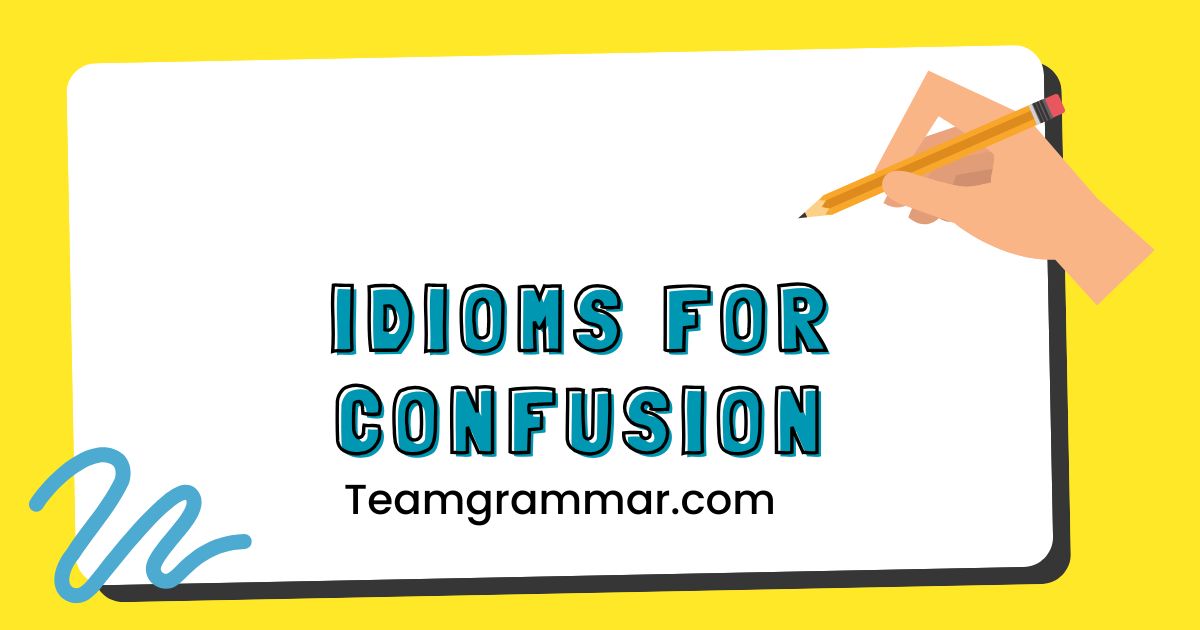45 Idioms for Confusion: Mastering Confusing English Expressions
Understanding idioms is crucial for mastering English. Idioms add color and nuance to the language, allowing native speakers to express complex ideas in a concise and evocative way.
However, idioms can be particularly challenging for English language learners because their meanings are often not deducible from the individual words. This article focuses specifically on idioms related to confusion, a common experience we all face.
By learning these idioms, you’ll be better equipped to understand and participate in conversations, read literature, and express yourself more clearly and accurately. This guide will benefit English learners of all levels, from beginner to advanced, as well as anyone who wants to improve their understanding of idiomatic expressions.
This article provides a comprehensive overview of idioms related to confusion, including definitions, examples, usage rules, and practice exercises. The goal is to equip you with the knowledge and skills to confidently understand and use these idioms in your daily communication.
Table of Contents
- Definition of Idioms for Confusion
- Structural Breakdown of Idioms
- Types or Categories of Confusion Idioms
- Examples of Idioms for Confusion
- Usage Rules for Confusion Idioms
- Common Mistakes with Confusion Idioms
- Practice Exercises
- Advanced Topics: Nuances and Regional Variations
- FAQ: Frequently Asked Questions
- Conclusion
Definition of Idioms for Confusion
An idiom is a phrase or expression whose meaning cannot be understood from the ordinary meanings of its individual words. It’s a figure of speech that, through common usage, has acquired a specific meaning different from its literal interpretation.
In the context of confusion, idioms are used to describe states of bewilderment, perplexity, uncertainty, and lack of understanding. These idioms can range from mild expressions of uncertainty to strong declarations of complete disorientation.
Idioms related to confusion often serve to emphasize the intensity or nature of the confusion. They add color and vividness to descriptions of situations where understanding is lacking.
For example, saying someone is “in a fog” conveys a stronger sense of confusion than simply saying they are confused. These idioms can be used in various contexts, including everyday conversations, formal writing, and literature.
Understanding the nuances of these idioms is crucial for effective communication. Misinterpreting an idiom can lead to misunderstandings and misinterpretations.
Therefore, it’s important to learn the specific meanings of these idioms and how they are used in different contexts.
Structural Breakdown of Idioms
Idioms, by their nature, defy simple structural analysis. They often consist of a combination of words that, when taken literally, don’t make sense in the context of their idiomatic meaning.
However, we can examine some common structural patterns found in idioms related to confusion:
- Prepositional Phrases: Many idioms use prepositions to create a sense of being lost or disoriented (e.g., in a fog, out of the loop).
- Metaphorical Language: Idioms frequently employ metaphors to represent confusion (e.g., in the dark, a gray area).
- Figurative Verbs: Some idioms use verbs in a figurative sense to describe the act of becoming confused (e.g., draw a blank, get lost).
- Similes: Although less common, some idioms may use similes to compare confusion to something else (e.g., as clear as mud).
The structure of an idiom is often fixed, meaning that you cannot change the words or their order without altering the meaning or rendering the idiom nonsensical. For example, “in a fog” cannot be changed to “inside a fog” without losing its idiomatic meaning.
Understanding the structural components of idioms can help you recognize them more easily and remember their meanings. However, the key to mastering idioms is through exposure and practice.
Types or Categories of Confusion Idioms
Idioms for confusion can be categorized based on the type or degree of confusion they express. Here are some common categories:
Mild Confusion or Uncertainty
These idioms express a slight lack of understanding or mild uncertainty.
Moderate Confusion or Bewilderment
These idioms describe a state of being somewhat confused or perplexed.
Severe Confusion or Disorientation
These idioms convey a strong sense of confusion, disorientation, or complete lack of understanding.
Ignorance or Lack of Awareness
These idioms indicate a lack of knowledge or awareness about a particular situation.
Misunderstanding or Misinterpretation
These idioms describe situations where someone has misunderstood or misinterpreted something.
Examples of Idioms for Confusion
This section provides a comprehensive list of idioms related to confusion, categorized by the type of confusion they express. Each idiom is accompanied by a definition and example sentences.
Examples of Idioms for Mild Confusion or Uncertainty
The following table provides examples of idioms that express mild confusion or uncertainty. These idioms are often used to indicate a slight lack of understanding or a feeling of being unsure.
| Idiom | Definition | Example Sentence |
|---|---|---|
| A bit hazy | Slightly unclear or vague. | The details of the contract are still a bit hazy to me. |
| Not quite with it | Not fully alert or aware. | I didn’t sleep well last night, so I’m not quite with it today. |
| In two minds | Having difficulty making a decision; undecided. | I’m in two minds about whether to accept the job offer. |
| Up in the air | Unsettled; undecided; uncertain. | Our travel plans are still up in the air. |
| Have a question mark over something | To be uncertain about something. | I have a question mark over whether we can meet the deadline. |
| Beats me | I don’t know. | “Where did he go?” “Beats me.” |
| If you ask me | In my opinion (often used when offering an unsolicited opinion). | If you ask me, they should have invested in new equipment. |
| I’m not sure | Expressing uncertainty. | I’m not sure whether I can come to the party. |
| Your guess is as good as mine | I have no idea. | “What’s going to happen next?” “Your guess is as good as mine.” |
| Haven’t got a clue | To have no idea about something. | I haven’t got a clue what he’s talking about. |
| Not ring a bell | Not sound familiar. | That name doesn’t ring a bell. |
| Come to think of it | Now that I remember. | Come to think of it, I did see him yesterday. |
| Slip my mind | Forgotten | Oh, I’m so sorry, it completely slipped my mind! |
| Not know the first thing | To be completely ignorant about something. | I don’t know the first thing about cars. |
| Have no idea | To not know something. | I have no idea how to solve this problem. |
| At sea | Confused or not knowing what to do. | I’m completely at sea with this new software. |
| Not follow | Not understand. | I don’t follow your reasoning. |
| Could be | Possibly be true. | “Will it rain tomorrow?” “Could be.” |
| Don’t quote me | Said when you do not want to be held responsible for the accuracy of what you’re saying | The company is doing well, but don’t quote me, I’m not sure. |
| I wonder | Used to express a wish to know about something | I wonder when the train will arrive. |
Examples of Idioms for Moderate Confusion or Bewilderment
The table below presents idioms that describe a state of being somewhat confused or perplexed. These idioms suggest a greater degree of confusion than the previous category.
| Idiom | Definition | Example Sentence |
|---|---|---|
| In a fog | Confused or dazed. | I’ve been in a fog since I heard the news. |
| Hazy | Unclear, vague, or ill-defined. | The details of the accident are still hazy in my mind. |
| Mixed up | Confused or muddled. | I got all the files mixed up. |
| At sixes and sevens | In a state of confusion or disarray. | After the power outage, everything was at sixes and sevens. |
| Lost | Unable to understand something. | I’m completely lost in this lecture. |
| Baffled | Confused or perplexed. | The detective was baffled by the crime scene. |
| Perplexed | Completely baffled; very puzzled. | She looked perplexed when I asked her about it. |
| Puzzled | Confused and unable to understand something. | I’m puzzled by his strange behavior. |
| Throw someone for a loop | To confuse or surprise someone. | The unexpected question threw me for a loop. |
| Wrap your head around something | To understand something complicated. | I’m trying to wrap my head around this new concept. |
| Make head nor tail of something | To be unable to understand something at all. | I can’t make head nor tail of this instruction manual. |
| All Greek to me | Incomprehensible; meaningless. | The technical jargon was all Greek to me. |
| Clear as mud | Not clear at all; very confusing. | The explanation was as clear as mud. |
| Draw a blank | To be unable to remember something. | I tried to remember his name, but I drew a blank. |
| Go over someone’s head | To be too difficult for someone to understand. | The lecture went completely over my head. |
| Out of the loop | Not informed about something. | I was out of the loop because I was on vacation. |
| Clouded | Unclear or confused. | Her judgment was clouded by emotion. |
| In a muddle | In a confused or disorganized state. | My thoughts are in a muddle. |
| Foggy | Not clear or well-defined. | My memory of that night is foggy. |
| In a spin | Confused and agitated. | The news sent her into a spin. |
Examples of Idioms for Severe Confusion or Disorientation
The subsequent table lists idioms that describe a state of severe confusion, disorientation, or complete lack of understanding. These are used to express a high degree of puzzlement.
| Idiom | Definition | Example Sentence |
|---|---|---|
| Lost in the woods | Completely confused or disoriented. | I’m lost in the woods with this project. |
| Out to lunch | Not paying attention; completely unaware. | He seems to be out to lunch today. |
| Off your rocker | Crazy or mentally unstable. | You must be off your rocker to think that’s a good idea. |
| Round the bend | Slightly crazy or eccentric. | The pressure is driving me round the bend. |
| Not know if you’re coming or going | To be completely confused and disoriented. | I don’t know if I’m coming or going with all these changes. |
| Go haywire | To go out of control or become chaotic. | The computer system went haywire. |
| Beside yourself | Overwhelmed with confusion or other emotions. | She was beside herself with worry. |
| In a whirl | In a state of confusion or rapid activity. | My head is in a whirl after that meeting. |
| Discombobulated | Confused and disconcerted. | The loud noise left me feeling discombobulated. |
| Flustered | Agitated and confused. | She became flustered when she couldn’t find her keys. |
| Like a deer in headlights | So frightened or surprised that you are unable to move or think | When he asked me to marry him, I just stood there like a deer in headlights. |
| Have your head in the clouds | Not be aware of what is happening around you | She’s always got her head in the clouds, so I doubt she’s noticed anything. |
| Go to pieces | Become very upset or nervous and unable to act normally | She went to pieces after her mother died. |
| Lose it | To become unable to think clearly or control your emotions | I completely lost it when he told me he was leaving. |
| Not with it today | Unable to think clearly | Sorry, I’m not really with it today – I didn’t get much sleep last night. |
| Go bananas | To become very excited or angry | The crowd went bananas when the band came on stage. |
| Off the deep end | To become very angry or emotional | He went off the deep end when he heard what had happened. |
| Out of your mind | Extremely stupid or mentally ill | You must be out of your mind to spend that much money on a car! |
| Lose your marbles | To become crazy or lose your good sense | I think he’s losing his marbles – he keeps saying the same thing over and over. |
| Batty | Slightly crazy | My grandma is a bit batty, but I love her. |
Usage Rules for Confusion Idioms
Using idioms correctly requires understanding their specific meanings and contexts. Here are some general rules to follow:
- Context is Key: Pay attention to the context in which an idiom is used. The surrounding words and the overall situation will help you determine the intended meaning.
- Formal vs. Informal: Some idioms are more appropriate for informal settings, while others can be used in formal contexts. Be mindful of your audience and the tone of your communication.
- Don’t Overuse: While idioms can add color to your language, overuse can make your writing or speech sound unnatural or forced. Use them sparingly and appropriately.
- Fixed Expressions: Idioms are generally fixed expressions, meaning you cannot change the words or their order without altering the meaning or making the idiom nonsensical.
- Cultural Sensitivity: Be aware that some idioms may have different meanings or connotations in different cultures. Avoid using idioms that could be offensive or misunderstood.
For example, the idiom “all Greek to me” is generally used in informal settings to express a complete lack of understanding. It would not be appropriate to use this idiom in a formal presentation or a research paper.
Common Mistakes with Confusion Idioms
One of the most common mistakes with idioms is interpreting them literally. Because idioms have a figurative meaning, trying to understand them based on the individual words will often lead to misinterpretations.
Here are some examples of common mistakes with idioms related to confusion:
| Incorrect | Correct | Explanation |
|---|---|---|
| “I am literally in a fog today.” | “I am in a fog today.” | “In a fog” is an idiom and should not be taken literally. |
| “The explanation was clear like mud.” | “The explanation was as clear as mud.” | The correct idiom is “as clear as mud,” not “clear like mud.” |
| “I can’t do head or tail of this.” | “I can’t make head nor tail of this.” | The correct idiom is “make head nor tail of something.” |
| “I am out from the loop.” | “I am out of the loop.” | The correct idiom is “out of the loop,” not “out from the loop.” |
| “This is all Greek for me.” | “This is all Greek to me.” | The correct idiom is “all Greek to me,” not “all Greek for me.” |
Another common mistake is using the wrong form of the idiom. For example, saying “I am losing my head” instead of “I am losing my marbles.” While both phrases relate to confusion or distress, they have slightly different meanings and contexts.
Practice Exercises
Test your understanding of idioms for confusion with the following exercises.
Exercise 1: Fill in the Blanks
Complete the following sentences with the correct idiom from the list below.
Idiom List: in a fog, all Greek to me, beats me, up in the air, draw a blank
| Question | Answer |
|---|---|
| 1. I’m completely _________ about what happened last night. | in a fog |
| 2. The technical jargon was _________. | all Greek to me |
| 3. “Where did he go?” “_________.” | beats me |
| 4. Our travel plans are still _________. | up in the air |
| 5. I tried to remember her name, but I _________. | drew a blank |
| 6. After the accident, his memory was _________ about the details. | In a fog |
| 7. The instructions for assembling the furniture were _________. | All Greek to me |
| 8. “What time is the meeting?” “_________.” | Beats me |
| 9. Whether or not we will get the funding is still _________. | Up in the air |
| 10. When the police asked him about his whereabouts, he _________. | Drew a blank |
Exercise 2: Multiple Choice
Choose the correct meaning of the idiom in each sentence.
| Question | Options | Answer |
|---|---|---|
| 1. I’m completely at sea with this new software. | a) Lost on a boat, b) Confused, c) Enjoying the ocean | b) Confused |
| 2. The news threw me for a loop. | a) Made me happy, b) Confused me, c) Made me dance | b) Confused me |
| 3. He’s been out to lunch all day. | a) Eating lunch, b) Not paying attention, c) On vacation | b) Not paying attention |
| 4. I can’t make head nor tail of this report. | a) Understand it perfectly, b) Can’t understand it at all, c) Find it interesting | b) Can’t understand it at all |
| 5. She’s not quite with it today. | a) Very energetic, b) Not fully alert, c) Extremely happy | b) Not fully alert |
| 6. The new policy left everyone at sixes and sevens. | a) Organized and efficient, b) In a state of confusion, c) Happy and content | b) In a state of confusion |
| 7. He’s going round the bend with all the stress. | a) Becoming extremely successful, b) Becoming slightly crazy, c) Relaxing and enjoying life | b) Becoming slightly crazy |
| 8. After the long meeting, my head was in a whirl. | a) Perfectly clear and focused, b) In a state of confusion, c) Completely empty | b) In a state of confusion |
| 9. The details of the event are still a bit hazy. | a) Perfectly clear, b) Slightly unclear, c) Completely forgotten | b) Slightly unclear |
| 10. He drew a blank when asked about the incident. | a) Remembered every detail, b) Couldn’t remember anything, c) Told a detailed story | b) Couldn’t remember anything |
Exercise 3: Sentence Completion
Complete each sentence with the most appropriate idiom related to confusion.
| Question | Answer |
|---|---|
| 1. Trying to understand quantum physics is like trying to ___________. | wrap my head around something |
| 2. After the earthquake, the city was ___________. | at sixes and sevens |
| 3. Since I missed the meeting, I’m completely ___________. | out of the loop |
| 4. When he asked me about my past, I ___________. | drew a blank |
| 5. With all these changes happening at once, I don’t ___________. | know if I’m coming or going |
| 6. After the long and complicated lecture, the students felt like they were ___________. | in a fog |
| 7. The instructions were so poorly written that they were __________. | as clear as mud |
| 8. When the computer crashed, the entire system __________. | went haywire |
| 9. The complex legal jargon was completely __________. | all Greek to me |
| 10. After hearing the shocking news, she was __________. | beside herself |
Advanced Topics: Nuances and Regional Variations
For advanced learners, it’s important to understand that idioms can have subtle nuances and regional variations. The meaning or usage of an idiom may differ slightly depending on the speaker’s background, geographical location, or cultural context.
For example, the idiom “off your rocker” is more common in American English, while “round the bend” is more common in British English. Both idioms have similar meanings, but they are used in different regions.
Furthermore, some idioms may have multiple meanings or interpretations. The meaning of an idiom can also evolve over time, as language is constantly changing and adapting.
To truly master idioms, it’s important to pay attention to these nuances and variations. This can be achieved through extensive reading, listening, and interaction with native speakers.
FAQ: Frequently Asked Questions
Here are some frequently asked questions about idioms for confusion:
- What is the best way to learn idioms?
The best way to learn idioms is through exposure and practice. Read widely, listen to native speakers, and try to use idioms in your own speaking and writing. Use flashcards, online resources, and language learning apps to help you memorize and practice idioms.
- How can I avoid misinterpreting idioms?
Pay attention to the context in which an idiom is used. If you’re unsure of the meaning of an idiom, look it up in a dictionary or ask a native speaker. Avoid interpreting idioms literally, as their figurative meaning is often different from the literal meaning of the individual words.
- Are idioms important for English language learners?
Yes, idioms are essential for understanding and communicating effectively in English. They are commonly used in everyday conversations, literature, and media. Learning idioms will help you understand native speakers and express yourself more clearly and accurately.
- Can I use idioms in formal writing?
Some idioms are appropriate for formal writing, while others are more suitable for informal settings. Be mindful of your audience and the tone of your writing. Avoid using idioms that are too colloquial or informal in formal contexts.
- How can I tell if a phrase is an idiom?
If a phrase doesn’t make sense when you interpret it literally, it’s likely an idiom. Also, idioms are often fixed expressions, meaning you cannot change the words or their order without altering the meaning.
- Why are idioms so difficult to learn?
Idioms are difficult to learn because their meanings are often not deducible from the individual words. They are also culturally specific and may have different meanings in different contexts.
- Is it okay to use idioms from other languages in English?
Generally, it’s best to avoid using idioms from other languages in English, as they may not be understood by native speakers. Stick to idioms that are commonly used and recognized in English.
- How many idioms are there in the English language?
There are thousands of idioms in the English language, and new idioms are constantly being created. It’s impossible to learn all of them, but focusing on the most common and frequently used idioms will be beneficial.
- What resources can help me learn more idioms?
There are many resources available to help you learn idioms, including dictionaries, textbooks, websites, and language learning apps. Look for resources that provide definitions, examples, and practice exercises.
- How can I practice using idioms in conversation?
Try to incorporate idioms into your conversations with native speakers. Listen carefully to how they use idioms and ask them to explain any idioms you don’t understand. You can also practice using idioms with a language partner or tutor.
Conclusion
Mastering idioms related to confusion is a valuable step in becoming proficient in English. These expressions add depth and color to your language, allowing you to express nuanced feelings of uncertainty, bewilderment, and misunderstanding.
By understanding the definitions, usage rules, and common mistakes associated with these idioms, you can significantly improve your communication skills.
Remember that learning idioms is an ongoing process. Continue to expand your vocabulary, practice using idioms in context, and pay attention to how native speakers use them.
With consistent effort, you’ll become more confident and fluent in your use of English. Keep practicing, and soon you’ll be navigating the complexities of the English language with ease, even when things get a little confusing!







